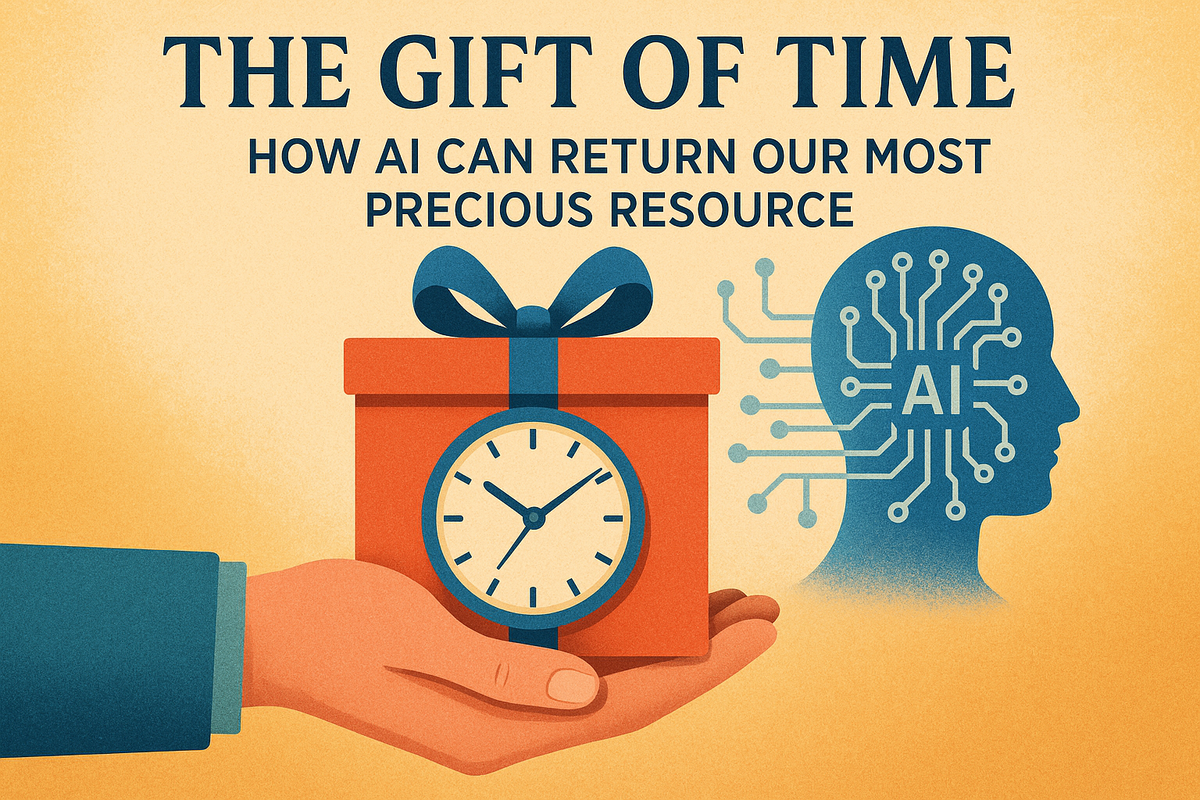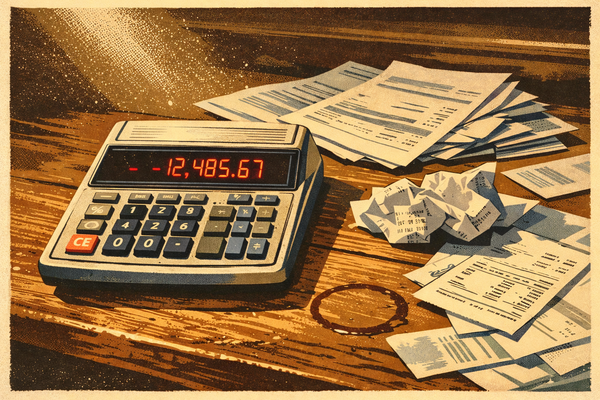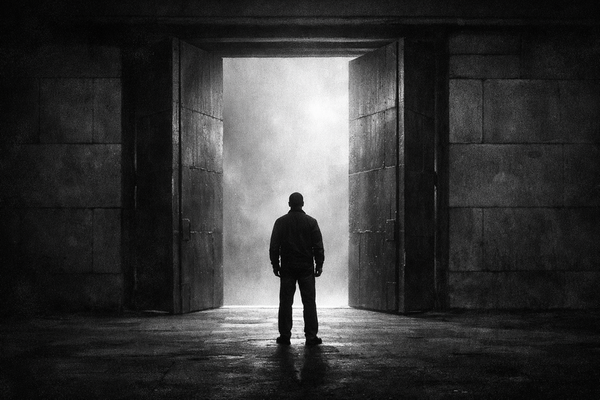The Gift of Time: How AI Can Return Our Most Precious Resource

"Time is the coin of your life. It is the only coin you have, and only you can determine how it will be spent. Be careful lest you let other people spend it for you."
— Carl Sandburg
Time moves in only one direction. Unlike money, which can be earned back, or possessions, which can be replaced, time spent is time gone forever. In our hyperconnected, always-on world, we've somehow convinced ourselves that being busy equals being productive, that rest is laziness, and that every moment must be optimized. But what if technology - specifically AI - could help us reclaim not just our time, but our relationship with it?
The Modern Time Crisis
We live in an era of time poverty. Despite labor-saving devices that would have seemed magical to previous generations, many of us feel more pressed for time than ever. We spend hours on tasks that feel necessary but unfulfilling: sorting through emails, scheduling meetings, researching purchase decisions, filling out forms, managing household logistics. These activities drain our finite hours without feeding our souls or advancing our deepest goals.
As Annie Dillard wrote, "How we spend our days is, of course, how we spend our lives." Yet too many of our days disappear into the machinery of modern life - not in meaningful work or restorative rest, but in what David Graeber called "bullshit jobs" and their personal equivalents: bullshit tasks.
The irony is stark. Technology promised to free us from drudgery, yet we often find ourselves servants to our tools rather than their masters. Push notifications demand immediate attention. Infinite content streams invite endless scrolling. The boundary between work and rest has dissolved, leaving many feeling perpetually behind.
Understanding the Value of Rest
Before exploring how AI might help, we must first rehabilitate our relationship with rest. In his groundbreaking book "Rest: Why You Get More Done When You Work Less," Alex Soojung-Kim Pang argues that rest is not the absence of work but rather its partner. History's most creative and productive figures - from Charles Darwin to Maya Angelou - structured their days around periods of intense focus alternating with deliberate rest.
Pang's research reveals that many renowned thinkers and creators worked only about four hours a day on their core creative tasks. Darwin took long walks, Churchill painted, Einstein sailed. These weren't distractions from their work - they were essential to it. During periods of rest, our brains consolidate memories, process emotions, and make creative connections. The default mode network, active when we're not focused on the outside world, is where innovation often sparks.
Rest comes in many forms: the deep restoration of sleep, the gentle rhythm of a walk, the focused calm of meditation, the joy of unstructured play with children, the satisfaction of preparing a meal without rushing. These moments aren't gaps between important activities - they are the important activities. They're where we remember who we are beyond our roles and responsibilities.
AI as Time Liberator
This is where AI enters not as another demanding technology, but as a different kind of tool - one that can handle the mundane to free us for the meaningful. Consider the myriad ways AI can return time to us:
Administrative Liberation: AI can draft emails, summarize lengthy documents, schedule meetings by coordinating between calendars, and handle routine correspondence. What once took hours can now take minutes, with human oversight ensuring accuracy and maintaining the personal touch where it matters.
Decision Support: From meal planning based on dietary preferences and what's in your fridge, to researching major purchases by synthesizing reviews and comparing options, AI can dramatically reduce the time we spend on decisions that, while necessary, don't require our full creative capacity.
Creative Assistance: Writers can use AI to overcome blank page paralysis, getting first drafts that they can then infuse with their unique voice. Programmers can offload boilerplate code. Designers can rapidly prototype ideas. The AI handles the mechanical aspects, leaving humans to focus on vision, meaning, and refinement.
Learning Acceleration: AI tutors can adapt to individual learning styles, providing personalized education paths. Language learning, skill development, and professional training can be tailored and accelerated, reducing the time needed to gain new capabilities.
Building Your Own Time-Saving Agents
While individual AI tools are powerful, the real transformation comes when we can orchestrate multiple tools to work together on our behalf. This is where workflow automation platforms become game-changers. Tools like n8n, Zapier, and Make.com allow you to create sophisticated AI agents without deep programming knowledge.
Imagine creating workflows that:
- Monitor your email for specific types of requests and draft appropriate responses
- Scan your calendar for upcoming meetings and automatically prepare briefing documents
- Track project tasks across multiple platforms and create daily summaries
- Process invoices, receipts, and financial documents automatically
- Research topics you're interested in and compile weekly digests
- Monitor your favorite sources for relevant content and organize it for later reading
With automation platforms, you can connect AI models to your existing tools - email, calendars, project management systems, databases - creating intelligent agents that work while you rest. A single workflow might save only 15 minutes a day, but several workflows together can reclaim hours each week. More importantly, they free your mental energy from constant task-switching and administrative overhead.
Beyond workflow automation, AI-powered scheduling tools like Motion take time management to the next level. Motion uses AI to automatically schedule your tasks around your meetings, considering priorities, deadlines, and your personal work patterns. It's like having an executive assistant who constantly reorganizes your day for optimal productivity and rest. When a meeting runs long or an urgent task appears, Motion automatically reshuffles everything else, removing the cognitive burden of constant replanning.
The beauty of these tools is that they democratize intelligent automation. You don't need to be a programmer to create systems that understand your specific needs and workflows. It's like having a smart, tireless team who knows exactly how you like things done - because you taught them yourself.
The Time We Reclaim
But what do we do with this reclaimed time? This is perhaps the most crucial question. If we simply fill it with more work, more consumption, more distraction, we've gained nothing. The promise of AI-enabled time liberation only fulfills itself if we use that time wisely.
As Seneca wrote, "It is not that we have so little time but that we waste so much of it." AI can help us stop wasting time on the forgettable, but we must choose to invest it in the memorable.
Imagine having an extra hour each day. That's time for:
- A long walk where your mind can wander
- Reading stories to children without watching the clock
- Pursuing a creative hobby you've always "meant to get to"
- Having unhurried conversations with loved ones
- Sitting quietly with morning coffee, thinking about nothing in particular
- Exercise that energizes rather than exhausts
- Preparing and enjoying meals as meditation rather than mere fuel
Designing for Human Flourishing
For AI to truly return time to us, we must be intentional about how we integrate it into our lives. This means:
Setting Boundaries: Just because AI can be available 24/7 doesn't mean we should be. Establishing clear times for AI-assisted work and times for disconnection preserves the rhythm of effort and rest that Pang identifies as crucial to creative work.
Maintaining Agency: AI should enhance human decision-making, not replace it. We must remain the authors of our own lives, using AI as a tool rather than an oracle.
Prioritizing Connection: The time saved should strengthen human relationships, not replace them with more efficient digital interactions. AI can handle logistics so humans can focus on presence.
Embracing Imperfection: Not everything needs to be optimized. Some inefficiencies - like taking the long way home or cooking from scratch when you could order in - carry their own rewards.
A New Relationship with Time
The ultimate promise of AI isn't that it will make us superhuman in our productivity. It's that it might make us more human by returning us to a pace of life that allows for both meaningful work and genuine rest. It could help us move from a scarcity mindset about time to one of sufficiency - not by giving us more hours in the day, but by helping us use those hours more intentionally.
As the Stoic philosopher Marcus Aurelius reminded us, "At dawn, when you have trouble getting out of bed, tell yourself: 'I have to go to work — as a human being. What do I have to complain of, if I'm going to do what I was born for — the things I was brought into the world to do?'"
AI can help us focus on exactly that - what we were brought into the world to do. Not email management or expense reports or calendar Tetris, but the uniquely human activities that give life meaning: creating, connecting, contemplating, and yes, resting.
Time remains finite. That will never change. But our experience of time - whether it feels scarce and pressured or abundant and flowing - is profoundly shaped by how we spend it. AI, thoughtfully applied, can help us spend less time on the forgettable and more on the memorable, less on the mechanical and more on the meaningful.
The question isn't whether AI will change how we use our time. It will. The question is whether we'll direct that change toward human flourishing - toward lives with space for both accomplishment and rest, efficiency and wandering, connection and solitude. The technology is here. The choice of how to use it remains ours.
In reclaiming our time, we reclaim ourselves. And in a world that often feels accelerated beyond human scale, that might be AI's greatest gift: the chance to slow down, breathe deeply, and remember that we are not just human doings, but human beings. As Thoreau wrote, "Time is but the stream I go a-fishing in." With AI handling the mundane, we might finally have time to fish.




